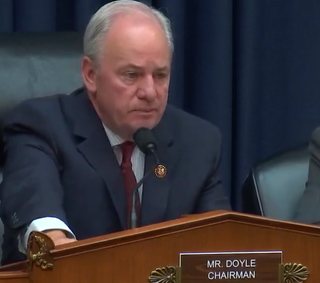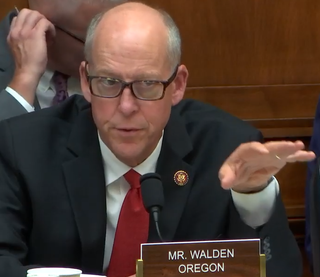House Communications Favorably Reports STELAR Renewal to Full Committee

The House Energy & Commerce Committee's Communications Subcommittee has approved by voice vote--there were no nays to be heard--a STELAR reauthorization legislation that includes some retrans reforms and a bill transparency provision, moving it to the full committee for further consideration.
But there was an astral asterisk next to that vote.
It became clear during the markup of nine communications bills Thursday (Nov. 14) that issues with HR 5035, the Television Viewer Protection Act (TVPA) STELAR reauthorization, were being moved along to the full committee rather than hashed out at the subcommittee level, particularly given that the bill was to be reauthorized by the end of next month or it expires.
Rep. Mike Doyle (D-Pa.), chairman of the subcommittee, thanked Republican leaders for being willing to support voting the bill out of the subcommittee, but those leaders and other Republicans made it clear they had issues both with the bill and the process.

Related: Stars Collide over STELAR
STELAR establishes the compulsory license that allows satellite operators to import distant network TV station signals to markets that lack them, and without having to negotiate individually with stations to do so. It also mandates good faith retransmission consent negotiations between broadcasters and MVPDS-satellite and cable.
TVPA not only renews that compulsory license, but expands the good faith provision to allow Smaller MVPDS to collectively bargain. ACA Connects has been pushing for that recognition for years.
Broadcasting & Cable Newsletter
The smarter way to stay on top of broadcasting and cable industry. Sign up below
The bill also requires MVPDs and ISPS--fixed and mobile--to include all charges in their advertised prices, and requires "greater transparency in electronic bills" and "remedies to consumers for certain increases in charges" (incorporating Rep. Anna Eshoo's [D-Calif.] True Fees Act).
Full committee ranking member Greg Walden (R-Ore.) signaled that "asterisk" early on when he said that eight of the nine bills were bipartisan. Walden tagged STELAR reauthorization as "the elephant in the room."
Broadcasters do not favor reauthorization, and Walden, a former broadcaster, told the committee he was not inclined to do so either. But even if he were, he took issue with the added retrans and bill transparency elements on TVPA.
"For those who see it as a vehicle to continue making media marketplace reforms, this Committee can and should examine such reforms in regular order and on their own merits, not as add-ons to an outdated policy," he said. "Moreover, for those who claim that 870,000 consumers could lose access to TV content, I say show me the numbers—nobody has seen them. Meanwhile, broadcasters have committed to chairman Graham in the Senate that they will work in good faith through the transition away from the distant signal license to a free and fair market to ensure consumers are protected."
He also complained that the text of the bill had not been shared with the minority. But Walden said that while he had his doubts about reauthorization, he was willing to talk as the bill makes its way to full committee consideration. But he reserved the right to object in full committee.
E&C chairman Frank Pallone (D-N.J.) praised the additions/reforms--particularly bill transparency--but also conceded there was work to do.
"I know my colleagues will have different views regarding this reauthorization, but these provisions are expiring and if we are going to address them, we must do it now," he said. "In that spirit, I look forward to working together with my colleagues as we prepare to move to the full committee to discuss any concerns in the hopes of building bipartisan consensus."
The Senate Commerce Committee this week pulled its consideration of a "clean" STELAR reauthorization from a markup. Commerce chairman Roger Wicker (R-Miss.) said he had pulled it because members wanted to add some reforms to that bill as well.

Walden noted that, saying that like the House version, there had been no legislative hearing on that bill, saying neither appeared to be ready for prime time.
Rep. Bob Latta (R-Ohio), ranking member of the subcommittee, also said he was disappointed that the bill was not being considered on regular order, but cited the other side's willingness to talk.
ACA Connects was celebrating the vote given that it allowed for collective negotiations for its members. “Chairman Doyle’s buying group requirement would mean federal law will permit smaller MVPDs to designate NCTC to negotiate retransmission consent on their behalf with gigantic TV station ownership groups like Nexstar and Sinclair Broadcasting Group," said ACA Connects President Matt Polka. "With the buying group provision, these large broadcast stations groups won’t be able to refuse to deal with the buying group chosen by traditional mom-and-pop video providers. These large broadcasters will have to deal with buying groups in the same way they deal with large cable operators.
“Consequently, ACA Connects urges the full Energy and Commerce Committee and the House of Representatives to approve the buying group provision before the expiration of key STELAR provisions on Dec. 31," Polka said.
The eight other bipartisan bills, which dealt with broadband mapping, network security, freeing up spectrum, and more were all reported favorably to the full committee for consideration, the last stop before a full House vote.
They were:
H.R. 4229, the Broadband Deployment Accuracy and Technological Availability Act or the Broadband DATA Act, which requires the FCC to put out new rules on collecting more granular broadband availability data and verify its accuracy, something the FCC is already in the process of doing under pressure from Congress and others.
H.R. 4227, the Mapping Accuracy Promotion Services Act (MAPS Act), which would make it illegal for carriers to submit inaccurate data on broadband availability.
H.R. 5000, the Studying How to Harness Airwave Resources Efficiently Act of 2019 (SHARE Act), which requires the National Telecommunications & Information Administration, which oversees federal spectrum, to consult with the FCC on a spectrum-sharing program and test bed.
H.R. 4998, the Secure and Trusted Communications Networks Act of 2019, which requires the FCC to create and maintain a list of "communications equipment and services that pose an unacceptable risk to national security and prohibits the use of funds made available by FCC programs to purchase, rent, lease, or otherwise obtain such equipment and services." It also creates a program for helping smaller providers pay for removing and replacing suspect tech and services from their networks.
H.R. 4461, the Network Security Information Sharing Act of 2019, which would direct the Secretary of Homeland Security, along with the Director of National Intelligence (DNI), the Director of the Federal Bureau of Investigation, NTIA, and FCC, to create a program for sharing supply chain security risk information with communications service providers and suppliers.
H.R. 2881, the Secure 5G and Beyond Act of 2019, which would direct the President to develop a "Secure Next Generation Mobile Communications Strategy” in consultation with the heads of FCC, NTIA, and Department of Homeland Security, as well as the DNI and Secretary of Defense."
H.R. 4500, the Promoting United States Wireless Leadership Act of 2019, which directs NTIA to "encourage participation by trusted American companies and other stakeholders in standards-setting bodies, and to offer technical assistance to stakeholders that do elect to participate, in the course of developing standards for 5G networks and future generations of communications networks."
H. Res. 575, "expressing the sense of the House of Representatives that all stakeholders in the deployment of 5G communications infrastructure should carefully consider and adhere to the recommendations adopted at the Prague 5G security conferences known as "the Prague Proposals." Those include that laws on connectivity are guided by equity and that influence from foreign entities must be taken into account.
Contributing editor John Eggerton has been an editor and/or writer on media regulation, legislation and policy for over four decades, including covering the FCC, FTC, Congress, the major media trade associations, and the federal courts. In addition to Multichannel News and Broadcasting + Cable, his work has appeared in Radio World, TV Technology, TV Fax, This Week in Consumer Electronics, Variety and the Encyclopedia Britannica.

